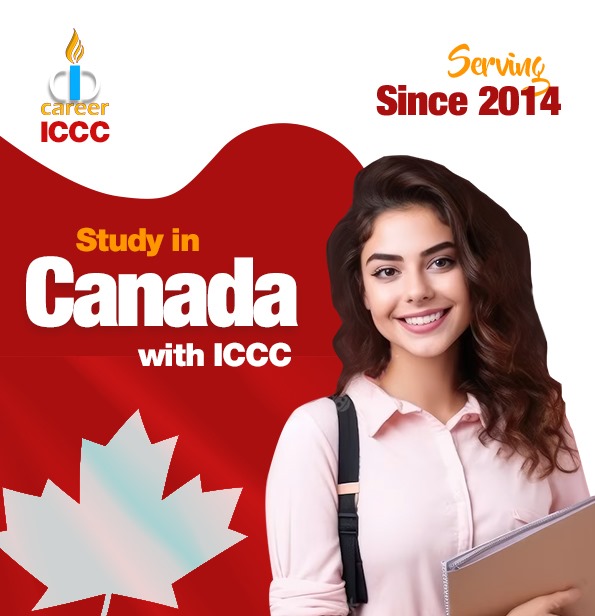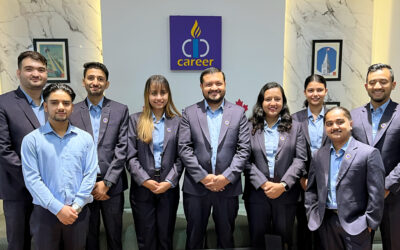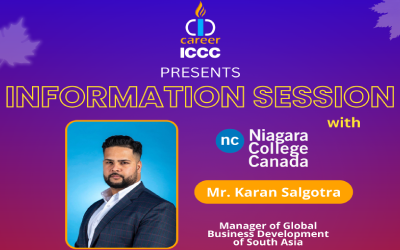What is SOP in context of study in Canada?
SOP stands for “Statement of Purpose”. It’s a kind of a letter or an essay you write when you’re planning to do something important in Canada, like studying, working, visiting, or even becoming a permanent resident.
Think of it like a letter to Canadian Immigration Officials where you introduce yourself and tell them why you want to do what you’re planning to do. It’s kind of like an interview but in writing. It’s an essay.

For example, if you want to go to Canada to study at a university or a college, you’d write an Academic SOP. In this document, you’ll talk about your academic background; why you want to study in Canada, what you want to learn, your career plans, and even why you plan to return to your home country after you finish studying.
If you’re planning to work in Canada, you’d write a Work SOWP (Spousal Open Work Permit). This document will explain why you want to work there, what job you have in your home country, your relationship status, your financial ability to support yourself, and how it will help you in your career.
And if you’re just visiting Canada, like for a vacation or attending graduation, or business conference, you’d write a Visitor Visa SOP. Here, you’d say why you want to visit, what you’ll do there, and that you’ll come back home after your visit.
An SOP, then, is essentially your personalised letter to the Canadian Visa Officer explaining your reasons for wanting to be there and why it will benefit you. It is a crucial component of your application, so be sure to give it your best consideration and justification.
Now, think about a regular interview where someone asks you questions and you answer them. Well, a written interview is similar, but instead of talking, you write down your answers. They give you questions, and you take your time to think about your answers and write them down neatly. That’s what the SOP tries to mimic.
Unique elements that make SOP stand out
Reasons not to Choose Nepal for Further Education
Academic Reasons:
Universities in Nepal lack modern facilities, laboratories, libraries, and other resources that are crucial for certain academic disciplines. Nepal offers fewer specialised academic programmes and research opportunities than more developed countries like Canada. Degrees from Nepalese universities may not be as widely recognised internationally compared to those from universities/ colleges in Canada.
The student’s evaluation methods have not been updated to meet the global education system. Only 20 marks have been allocated for internal assessment for a hundred full theory marks. This clearly shows uneven mark distribution. On the other hand, students in foreign colleges are highly motivated by professors in research and projects. Students tend to engage in all these works because projects are evaluated to give assessment marks.
Fails Addressing the Skill Gap:
Despite efforts to align educational programmes with labour market demands, there remains a mismatch between the skills graduates possess and the skills demanded by employers. This leads to unemployment among educated youth. There exists little cooperation between companies and educational institutions. Industry participation in mentoring programmes, internships, training opportunities, and industry involvement in curriculum creation are all lacking. The absence of a structured placement system in the final year of bachelor’s and master’s degree programmes is a sad yet true aspect of our education system.
Reason to choose Canada over Nepal
Embracing Technological Advancements:
Canada is renowned for their widespread access to modern technologies and resources. As an international student, you are likely to have access to advanced laboratories, research facilities, and high-speed internet. This allows you to deeply engage with technology, whether for academic or personal development.
Global Exposure:
Studying in Canada would provide exposure to diverse ideas and innovations that are otherwise inaccessible in Nepal. Living and working in a foreign country can help you become more independent, confident, and adaptable. Likewise, international experience can help you develop new skills, gain new insights into your field, and build a more diverse professional network.
Prioritising Practical Learning:
The environment for practical learning is broad and diverse in Canada. Co-ops help students participate in paid work terms related to their subject of study. Through this practical experience, students can apply what they have learned in the classroom to the actual workplace, gaining insights into the sector and useful skills. Workshops and labs dedicated to skills offer opportunities for technical education and experimentation, especially in disciplines like Engineering, Science, and Technology. Furthermore, industry-partnered internships and placements provide students with valuable networking opportunities and direct experience in professional settings.
Promoting Entrepreneurship and Innovation:
The colleges and universities in Canada provide resources, mentorship, and favorable business environments to support entrepreneurial endeavours. Initiatives such as dedicated entrepreneurship centres and incubators provide aspiring entrepreneurs with mentorship, funding opportunities, and access to networks. Capstone projects teach students how to develop business ideas, conduct market research, write business plans, and understand the fundamentals of starting and managing a business.
Career Prospects:
Technology, agriculture, mining, healthcare, business, renewable energy, and trades are well-established fields in Canada. The variety of employment options available in Canada that match your goals and academic interests present a bright future for your career. Canada’s stable economy and resource-rich industries contribute to job creation. Different provinces have varying demands for certain professions. For example, Alberta has more opportunities in oil and gas, while Ontario and Quebec may focus on technology and manufacturing.
GUIDELINES FOR WRITING SOP FOR CANADIAN STUDY PERMIT
Here is a format provided by the group of SOP experts of ICCC that you can follow to craft your unique SOP.
INTRODUCTION:
Anecdote: Begin with a detailed account of what inspired you to aspire to higher education in your field of interest. An anecdotal approach is considered the most effective approach for the introductory paragraph. You can also begin with a thought-provoking question or a powerful quote. This initial hook sets the tone for the rest of your narrative.
Mention your full name, your intended course of study, college/university name, intake dates, and course duration.
Example:
One memorable day in high school, I helped my grandmother set up her new smartphone. Seeing how happy she was to connect with her friends and family through video calls made me realise the positive impact technology can have on people’s lives. This moment inspired me to learn more about technology and its potential.
My name is XYZ, and I’ve always been curious about how technology works and helps people. I plan to study Computer Science at XYZ College/University. My course, a Bachelor of Science in Computer Science, will start in September 2024 and last for four years. This program will help me gain the knowledge and skills to create innovative solutions that can benefit society.
ACADEMIC BACKGROUND:
Mention all about your college experiences, courses in your UG (Under Graduate)/High School curriculum that you were particularly interested in, grades, and graduation date.
Mention internships, training, workshops, seminars, and industrial visits that you have been to, make sure they are all relevant to the program, and you have supporting documents to verify them too.
Example:
During my time at XYZ School, I excelled in courses like Mathematics, Physics, and Computer Science, earning top grades. My interest in technology grew stronger with each passing year, particularly during a course on programming where I developed a simple game as a project. I graduated in June 2022 with honours.
In addition to my high school studies, I completed an internship at XYZ Company, where I worked on developing a user-friendly app. This experience was invaluable, allowing me to apply what I learned in the classroom to real-world problems. I also attended several workshops on AI and machine learning, which deepened my understanding of modern technologies. Furthermore, I participated in an industrial visit to XYZ Compnay, where I observed the inner workings of a tech company. These experiences have all reinforced my passion for technology and prepared me for further studies in Computer Science.
LANGUAGE PROFICIENCY:
Mention about your IELTS/PTE score.
NB: If you have a low score, reappear for the exam before applying for a visa to avoid any unnecessary visa refusal.
Example:
I recently took the IELTS exam and achieved an overall band score of 8.0, with 9.0 in Listening, 8.0 in Reading, 7.0 in Writing, and 8.0 in Speaking. This score reflects my strong proficiency in English and my ability to effectively communicate in both academic and everyday settings.
PROFESSIONAL EXPERIENCE: (IF ANY)
Talk about your roles and responsibilities at your job, and in your current and previous organisations. Highlight any achievements and initiatives taken by you. If you have led teams or events, mention them as well. Do mention the organisation/company name, your position, and your joining date. Make sure that the work exposure that you showcase on the SOP does not overlap the standard job market policy. Over qualification is a major issue in many refused SOPs.
Example:
I have worked as a XYZ at XYZ Company since July 2022. In this role, I was responsible for developing and maintaining web applications, collaborating with cross-functional teams to design user-friendly interfaces, and troubleshooting technical issues. One of my significant achievements was leading a team to create a customer feedback system that improved user satisfaction by 20%. Additionally, I initiated and organized a coding boot camp within the company, which helped enhance the skills of new hires. These experiences have honed my technical skills and leadership abilities, preparing me for further studies and challenges in the field of Computer Science.
WHY DIPLOMA/BACHELOR/MASTER OR ANY HIGHER DEGREE NOW?
- Mention why you want to do your Master’s at this stage of your career. The idea is to link your past work or study experiences; it must seem progressive.
- If you have changed your course of study, for example, your present programme is different from your previous academic background, explain and defend what caused you to shift.
- Discuss your knowledge gap, how this course aims to fulfill it, and discuss the contemporary and future demands of this course in your country.
Example:
After gaining valuable experience as a XYZ at XYZ Company, I realised the need to deepen my knowledge of advanced computing technologies to keep pace with the rapidly evolving tech industry. While my undergraduate studies provided a solid foundation in Computer Science, my professional experiences highlighted areas where I could benefit from further academic exploration, particularly in artificial intelligence and machine learning.
Studying Computer science for a bachelor’s degree has essentially made me a better problem-solver. I can think of solutions in steps that break down problems into sub-problems like algorithms. The majority of industries in the digital age rely on data and software. Everything is impacted by computer science and IT, including scientific research, healthcare, banking, and communications. Our everyday lives are supported by computing, from the websites and apps we use to the information exchange that makes financial, transportation, and health services possible. Because, nearly all industries are undergoing digital change, computer science skills are in higher demand than ever. The future cannot be imagined without computers.
Now, I am a mid-career professional in the field of computing. I chose to pursue a Master’s degree at this stage in my career to bridge the knowledge gap and acquire specialized skills that will enable me to contribute more effectively to innovative projects. This advanced degree will help me stay ahead of technological advancements and meet the growing demands of the tech industry in my country, where there is an increasing need for experts in AI and data science. Transitioning from hands-on work to a more research-oriented academic environment will allow me to explore new ideas and methodologies that I can later apply in practical settings. This Master’s program will not only enhance my technical expertise but also open up new career opportunities, positioning me as a leader in the field of technology.
WHY NOT STUDY IN YOUR COUNTRY?
Mention genuine reasons not to study in your country. Never criticize your home country.
Example:
While Nepal has made significant strides in education, offering many reputable institutions, certain limitations have influenced my decision to pursue my Master’s degree abroad. The primary reason is the lack of specialised programmes in advanced computing technologies such as artificial intelligence, machine learning, and data science. These advanced fields are essential for my career growth and are not yet fully developed in Nepalese universities.
Additionally, studying abroad exposes diverse perspectives and advanced research facilities unavailable in Nepal. International programmes offer extensive resources, the latest laboratories, and collaboration opportunities with leading experts and researchers worldwide. This global exposure is crucial for staying at the forefront of technological innovation.
Furthermore, studying abroad allows for networking with a global community of professionals, which can lead to future collaborations and career opportunities that are not as readily accessible within Nepal. By gaining this international experience and advanced education, I aim to contribute to the technological advancement of Nepal upon my return, helping to bridge the gap and bring new knowledge and skills to my home country.
WHY STUDY IN CANADA?
Present relevant points to support why you selected Canada for your higher study. You can discuss about following things: The history of international students in Canada, Quality and credibility of degree, PGWP, Affordability, Safety, multicultural society, and so on.
Example:
I chose to pursue my higher studies in Canada for several compelling reasons. Canada has a long-standing history of welcoming international students and is known for its high-quality education system and globally recognised degrees. Canadian universities consistently rank among the best in the world, offering cutting-edge programs and research opportunities that align perfectly with my career aspirations in advanced computing technologies.
The Post-Graduation Work Permit (PGWP) programme in Canada is another significant factor in my decision. This programme allows international students to gain valuable work experience in Canada after completing their studies, providing a pathway to apply theoretical knowledge in real-world settings and enhancing employability.
Affordability is also a key consideration. Compared to other popular study destinations, Canada offers a high standard of education at a more reasonable cost. Scholarships and financial aid opportunities further make studying in Canada an attractive option.
Canada is renowned for its safety, ranking as one of the safest countries in the world. This provides peace of mind for both students and their families. Additionally, Canada’s multicultural society fosters an inclusive and welcoming environment where students from diverse backgrounds can thrive. This cultural diversity enriches the learning experience and helps build a global network of peers. Overall, the combination of academic excellence, post-graduation opportunities, affordability, safety, and cultural diversity makes Canada the ideal destination for my higher education.
WHY THIS COLLEGE/UNIVERSITY?
Finally, mention specific reasons why you prefer a particular university/college.
- Mention about ranking, industry connections they have built, graduation rate, and student services and facilities that impressed you, name the courses in the curriculum that will help you learn the skills to accomplish your goals.
- Talk about any ongoing/previous research in the university/college that interests you. Name at least one faculty member whose areas of expertise match your areas of interest.
- Mention any other feature or unique achievement of the university/college or programme that dragged your attention.
Example:
I have chosen to pursue my Master’s degree at XYZ University/College for several reasons that align perfectly with my academic and professional goals. XYZ University/College consistently ranks among the top institutions globally for Computer Science, which assures me of receiving a world-class education. The university/college’s strong industry connections with leading tech companies provide valuable internship and job placement opportunities, enhancing my career prospects post-graduation.
One of the standout features of XYZ University/College is its impressive graduation rate, which reflects the high level of student satisfaction and success. The university/college offers extensive student services and state-of-the-art facilities, including advanced computing labs and research centers, supporting my learning and development. The curriculum at XYZ University/College includes courses such as Advanced Machine Learning, Artificial Intelligence, and Data Science, which are crucial for acquiring the specialized skills I need. These courses are designed to equip students with both theoretical knowledge and practical expertise, ensuring I am well-prepared for the challenges of the tech industry.
I am particularly interested in the ongoing research at XYZ University’s/College’s Artificial Intelligence Research Lab, which is pioneering innovative solutions in AI and machine learning. Dr. ABC, a renowned expert in machine learning and data analytics is a faculty member whose research aligns with my interests. Her work on developing efficient algorithms for big data analysis is something I am eager to learn from and contribute to. Additionally, XYZ University’s/College’s commitment to fostering innovation and entrepreneurship through its startup incubator programme is another feature that attracted me. This programme provides resources and mentorship for aspiring entrepreneurs, which will be invaluable as I aim to develop and launch my tech solutions in the future.
CAREER GOALS:
Divide your goals into short-term and long-term – remember, short-term goals start after you graduate with the Master’s/bachelor’s/Diploma degree and your degree is not part of the short-term goals.
So, in short-term goals, you need to talk about what you want to do after completing your degree. Would you want to continue your studies? If yes, mention it. Would you want to work in an industry job or get into research? Mention the names of the companies that you have in mind to work for and the job role. Specifically, mention the skills that you need to develop to work in the desired capacity. If research is in your mind, talk about your desired field and preferred areas of research.
Coming to long-term goals, discuss how you wish your career to progress in about 10-15 years, and be specific. Whether you want to start your own company or be a CEO, mention the process in detail.
Example:
After completing my Master’s degree in Computer Science, my immediate goal is to gain practical experience in the tech industry. I aim to secure a position as a Software Engineer at a leading technology company such as Google or Microsoft. These companies are renowned for their innovative work culture and cutting-edge projects, which align perfectly with my career interests in artificial intelligence and machine learning. To excel in this role, I recognise the importance of further developing my programming skills in languages like Python and Java, as well as enhancing my proficiency in data analysis and machine learning algorithms. Continuous learning and staying updated with the latest technological advancements will be crucial for my success in the industry. Looking forward, I am also considering the possibility of pursuing a doctoral degree in Computer Science to deepen my expertise and contribute to groundbreaking research in AI-driven applications. Research interests me greatly, particularly in areas such as natural language processing and computer vision, where I believe advancements can revolutionise how we interact with technology.
In the long term, approximately 10-15 years from now, I envision myself leading a team of experts as a Chief Technology Officer (CTO) at a prominent tech company or possibly founding my own startup specialising in AI-driven solutions. I am passionate about leveraging technology to solve complex problems and improve people’s lives globally. To achieve this goal, I plan to gain extensive experience in various facets of technology management and leadership, honing my skills in strategic planning, team building, and innovation management. Building a strong network within the tech industry and establishing partnerships with academia and research institutions will also be essential to realising my entrepreneurial aspirations. Ultimately, my career trajectory is driven by a desire to make meaningful contributions to the field of artificial intelligence, advance technological innovation, and create impactful solutions that address real-world challenges.
FINANCIAL BACKGROUND:
Show funding sources such as Personal/Sponsors’ Savings, educational loans, Scholarships/Grants (if any), annual income, and immovable assets.
Example: I would like to provide an overview of my financial standing and the ability of my sponsors to support me financially during my stay in Canada. My sponsors possess significant movable assets, such as income, savings, and investments worth CAD$….., as well as immovable assets like property and real estate worth CAD$…… These resources ensure that all expenses associated with my studies and living in Canada can be comfortably covered without financial strain.
INTENTION TO RETURN TO YOUR HOME COUNTRY:
Start by explaining your reasons for returning home. This could include family ties, career opportunities, ties with your community, culture, festivals, and financial ties. Discuss in detail how you would support your parents, how you would contribute to your society, how you are connected to your culture, and so on.
Example: Returning to my home country after completing my education abroad is a decision rooted in several personal and professional motivations. First and foremost, I cherish the strong bonds I have with my family and community back home. Being close to my parents and extended family members is of utmost importance to me, as they have been my pillars of support throughout my journey. My parents spent sleepless nights when I was an infant and were the emotional support when I experienced disappointment in my life. Dignity and respect towards them is the only way I see to repay my debt. I want to stay by their side when they can no longer take care of themselves. I have no intention of leaving my parents alone to struggle and settle overseas. I cannot even think of doing so in my imagination. I am bound to be with my family for my inner peace and happiness.
Upon my return, I am eager to contribute to my society by applying the knowledge and skills acquired during my studies. I aim to participate in local initiatives and technological advancements that can benefit my community directly. Moreover, reconnecting with my cultural heritage, celebrating traditional festivals, and actively engaging in community activities are integral parts of my identity that I look forward to embracing once again. Financially, I intend to support my parents and invest in local businesses to stimulate economic growth within my community. By blending my international education with local insights and values, I am committed to making a meaningful impact and contributing positively to the development of my home country.
CONCLUSION:
Conclude your SOP with hopeful, positive, and sensible thoughts. Convey that you are genuinely excited about the opportunity. Appreciate the Visa Officer for taking the time to review your SOP. Also, mention that you are open for any inquiries to be made.
Example: In conclusion, my decision to apply for a study permit is motivated by a genuine desire to advance my academic and professional career in a globally recognized educational environment. I am committed to fully complying with all rules and regulations governing international students in Canada, and I understand the importance of upholding the country’s laws during my stay. I assure the Visa Officer that I am prepared to adhere to these regulations conscientiously. Moreover, I am open to any inquiries or verifications that may be necessary to process my application. Thank you for considering my application, and I look forward to the opportunity to contribute positively to the Canadian academic community.
FAQ’S
- How Long Should a Statement of Purpose be?
There is no specific word limit as long as you mention relevant information in your SOP. Generally, it concentrates around 2000 words.
- Can I use AI to write my SOP?
You can use AI as a tool to help clear your underlying doubts. But, never use AI to write your complete SOP. The language does not sound natural and the data is redundant. There is no uniqueness in it. You can visit the ICCC office to seek assistance if you are struggling with SOP.
- Can I copy from others’ SOPs? Is plagiarism an issue in SOP?
No, you should not copy from others’ Statements of Purpose (SOPs). Plagiarism is a significant issue. Instead, you can take references from them. Understand the format and crucial elements of the writing, and try to write on your own. The first draft may sound a little weak but you can review it 2-3 times before giving it a final touch.
- Do I need to mention my previous refusal from another country in the SOP?
Yes, it is generally advisable to mention any previous visa refusals from other countries in your SOP. Transparency is crucial when applying for a student visa, and omitting such information could be viewed negatively by visa officers. If you have had a previous refusal, explain the circumstances honestly and provide details about how you have addressed any issues that led to the refusal.
- Can I get my SOP written by a third party?
No, it is not advisable to have your Statement of Purpose (SOP) written by a third party. An SOP is a personal document that reflects your individual experiences, aspirations, and motivations. Others do not know in depth about your details and your vision. Take time to write your SOP, do not prepare it in a hurry.
- How many pages my sop should be?
There is no specific page limit for the SOP. But you must avoid unnecessary details.
- Shall I use headings or subheadings in SOP for the Canada Study Permit?
Using headings or subheadings in your Statement of Purpose (SOP) for a Canada Study Permit is generally not necessary. Most SOPs are expected to be structured as a continuous letter rather than a document divided by headings and subheadings. The key is to ensure that your SOP flows logically and covers all essential points clearly. Moreover, an SOP follows the concept of an essay plus a letter.
- I am not a good writer. I’m worried. How will I write my SOP?
It’s completely normal to feel concerned about writing your Statement of Purpose (SOP), especially if you don’t consider yourself a strong writer. Starting early reduces stress. Contact the SOP specialists at ICCC via email, phone calls, and WhatsApp to clear your doubts.
- How important is SOP for a Canadian Student Visa?
Along with other documents, the SOP is also an essential part of your visa application that can greatly influence the outcome. Every document holds equal significance.
SAMPLE SOP FOR CANADA STUDENT VISA
Here is an SOP sample for a Canadian student visa:
To:
The Visa Officer,
Canadian High Commission,
New Delhi, India
SUBJECT: STATEMENT OF PURPOSE
Honorable Visa Officer,
The four years of a bachelor’s degree in Business Administration prepared me to be a strong, self-assured leader in managing people and running a business. During the final year of my bachelor’s degree, I co-founded an herbs processing business in collaboration with my two entrepreneur friends. My indulgence in my own co-founded business has inspired me to make my business a global business. With this vision, I am delighted to introduce myself as XYZ (your name). University/ College has already deemed me a worthy student and has admitted me to the Master of Business Administration (MBA) program scheduled to commence from (intake date). In this brief letter, I have attempted to describe my academic endeavors and professional aspirations.
Reflecting on my academics, I completed high school in (graduated year) with an impressive score of (attained GPA) out of 4. Following this, I enrolled in a Bachelor of Business Administration (BBA) in 2019 and completed it in 2023 with an outstanding (attained CGPA) out of 4. It built a solid foundation in business principles, management practices, economics, finance, and many more. Additionally, throughout the BBA journey, I also developed significant skills, including problem-solving, communication, teamwork, and analytical thinking.
I co-founded my own business in June 2023. As an entrepreneur, I am still learning and adapting, and it is thrilling to find myself in different roles every day. Needless to say, my day begins with new challenges, sometimes, it is frustrating accounts; sometimes, it is the quality of the powder product that does not match the standard batch, and sometimes, it is a maintenance issue. The one thing that I have understood in these two years is starting a business is an easy task but to keep it running smoothly over years is a pretty much tough aspect of any business. The most important thing to keep in mind is business is full of uncertainties. I do not want this unpredictability stance to impact my business. Instead of random decisions, I want to make use of data analysis, experiences, and logic to make upcoming business decisions. To do so, I found no better program than diving into two years of experience in Master of Business Administration.
The most obvious benefit of earning an MBA is that a student will learn various hard and soft business skills. hard skills include creating and evaluating financial statements; crafting marketing strategies based on key performance indicators and market research; and gathering, processing, and analyzing data to drive business decisions. Soft skills include leadership, management, empathy, time and project management, and strategic and innovative thinking. One particular reason that pulled me towards an MBA is it provides real-world practice, so you know how to think strategically when complexities arise. Over the two-year program, MBA students read, analyze, and discuss about 500 cases, taking away valuable lessons to use throughout their careers. What can an aspiring entrepreneur like me desire more than such a learning outcome? The early stages of entrepreneurship are about product, passion, and people. I have confidence in my product and I am passionate about my business too. But, I need to work on branding to reach people.
I would get a chance to network with entrepreneurs from all around the world who have either started a business or are willing to do so in the future. I will get connected to highly experienced professors, with whom I can connect if I need any further advice even after my graduation. It will also be a golden opportunity to take my project to a global scale and represent it in front of my future classmates. I can get feedback and genuine advice regarding my business.
The majority of business school curricula in Nepal are theoretical in nature. They employ the conventional methods of case studies, talks, and lectures. Instead of teaching actual conduct, they teach ideas only. Traditional teaching methods and a lack of trained instructors are problems in MBA education in Nepal. MBA in Nepalese business schools includes imparting knowledge in accounting, finance, statistics, economics, and more. Unfortunately, the emphasis is far less on being and doing. Because of this, graduates are ill-prepared for the majority of management work, which entails difficult problems with no clear answers. Despite having extensive knowledge, MBA students in Nepal are unable to use it. These reasons have significantly influenced my decision to seek higher education opportunities outside of Nepal.
Canadian universities and colleges offer high-quality education, with a strong emphasis on research and practical learning. Many institutions are world-renowned, and Canadian degrees are recognized and respected around the globe. Compared to other popular study destinations, such as the United States and the United Kingdom, Canada offers relatively affordable tuition fees for international students. Additionally, living costs in Canada are generally lower than in other developed countries. In addition, it is a welcoming and multicultural country, with a diverse population and a strong commitment to inclusion and equality. International students can experience a rich and varied cultural environment while studying in Canada. International students in Canada are allowed to work part-time while studying, and can also apply for a post-graduation work permit to stay and work in Canada after completing their studies. This can be a great way to gain valuable work experience and improve career prospects. Moreover, Canada is consistently ranked as one of the safest and most livable countries in the world. Its cities are known for their cleanliness, friendliness, and high quality of life. Considering all these attractive reasons, I have decided to study in Canada.
UCW has a strong reputation for providing high-quality education in the business field. UCW holds a 5-star rating from the QS Stars higher education rating system. Notably, it is the first university in British Columbia and third in Canada to get 5 Stars. UCW has a diverse student body, with more than 11,000 students from more than 110 different countries. The students of the MBA programs are winners of the 2023 BC MBA Games and 2024 national MBA Games. No doubt, it reflects the quality of education they provide. We’ve partnered with leading business and tech companies such as Salesforce, Amazon, Shopify, Facebook, and many others to incorporate their latest technology and expertise into the Master of Business Administration program courses at UCW. According to the latest data from December 2023, the alumni that participated in the study, 94% of their MBA students are working or have a job lined up within one year of graduating. Moreover, UCW is located in Vancouver, one of Canada’s most vibrant and diverse cities, which provides excellent opportunities for networking, internships, and employment. Considering all these reasons, I have selected UCW for my higher business studies.
Earning a Master of Business Administration (MBA) degree from Canada is going to be a significant milestone for me. Soon after completing it, I will be looking forward to getting some work experience under a post-graduation work permit (PGWP) supported by the Canadian government for International students. It will be a golden opportunity for me to understand the Canadian work environment and learn from it. After accumulating a few years of work experience, I would return to Nepal. After landing here, my first step is going to find a suitable job in Nepal. Banking, finance, consulting, marketing, manufacturing, and technology are some of the fields that are craving for MBA graduates in my country. I aim to join the top herbs processing business in Nepal to take a deep analysis of the business ecosystem of my country. Such circumstances will act as an experimentation of my knowledge in a real field. It will definitely diversify my skillset. There, I can play a role as Business Analyst, Product Manager, Operations Manager, Sales Manager, and so on. Companies, I am looking forward to joining include Herbs Production and Processing Co. Ltd., Fleur Himalayan Ltd., Gorkha Ayurved Company Pvt. Ltd., and so on. I can earn a respectable amount of salary working with these companies. I plan to remain affiliated with these companies for a year and then work full-time in my company. Previous work experience certainly helps for many skills we learn in the workplace are transferrable. There is so much knowledge and so many skills embedded in a successfully running business. I will be introduced to cash flow statements, sales techniques, software tools, and complex soft skills like emotional intelligence in a diverse workplace and the ability to navigate a world of clients, investors, and coworkers. This is going to be a lifelong learning opportunity for me. After gaining insights from the work atmosphere in Nepal, I will reunite with the team who will be working for our company in my absence.
Dear immigration official! Here I emphasize that my only aim in requesting a student permit is to get an education in your country. Eventually, I will return to put my learning into practice in my startup here in Nepal. Business is my dream project and I am living for it. My country Nepal has all the raw materials; I need to flourish my business. The young generations like us need to utilize our skills and knowledge to enhance the development of the country. After growing up here, we need to have responsibilities toward our country. After investing so much of my parent’s efforts and finances, I do not want to brain drain my nation.
Another reason underlying my return is my family. Our parents always find a way to make sure we have everything we need as we grow up. Likewise, my parents may not be perfect but they are the most precious gift God has ever given to me. I cannot repay their contribution to my life. Yet, goodness towards my parents is the greatest thing I can offer to them. Our parents deserve our honor and respect for giving us life itself. Beyond this, they almost always need love and support from us as they grow old. I want to take care of them by being with them. I want to take care of their nutrition, medication, food, and emotional and psychological support. I know that all they want from me is my presence. Officer! I have no plans to abandon my parents and settle abroad. I am obliged to return to fulfill my duties towards my family.
In conclusion, I am delighted about the chance to continue my education in Canada and am certain that I have proven my eligibility for a student visa. Should you have any questions or require further information, I am more than willing to provide additional details. I will abide by the rules and regulations set forth by the Canadian government and my university and prove to be a legitimate temporary student during my stay in your country. I appreciate you taking the time to review my application. I’m excited about the prospect of adding to and gaining from Canada’s excellent academic environment. With your decision, my dream to get an education overseas will come true. I foresee getting the most out of this opportunity.
Yours Sincerely,
(Your name)
Contact your nearest ICCC branch office today
We have branches in Kathmandu – Kamaladi, Kathmandu – Putalisadak, Kathmandu – Chabahil, Pokhara, Chitwan, Butwal, Jhapa, and Canada – Milton.

We work hard to make the Canada Study Visa process simple and convenient for students. Our staff are available at all our branches during office hours. Alternatively, you can contact us through the LIVE CHAT option on the website. We have a wide range of career options for our students to study in Canada.







